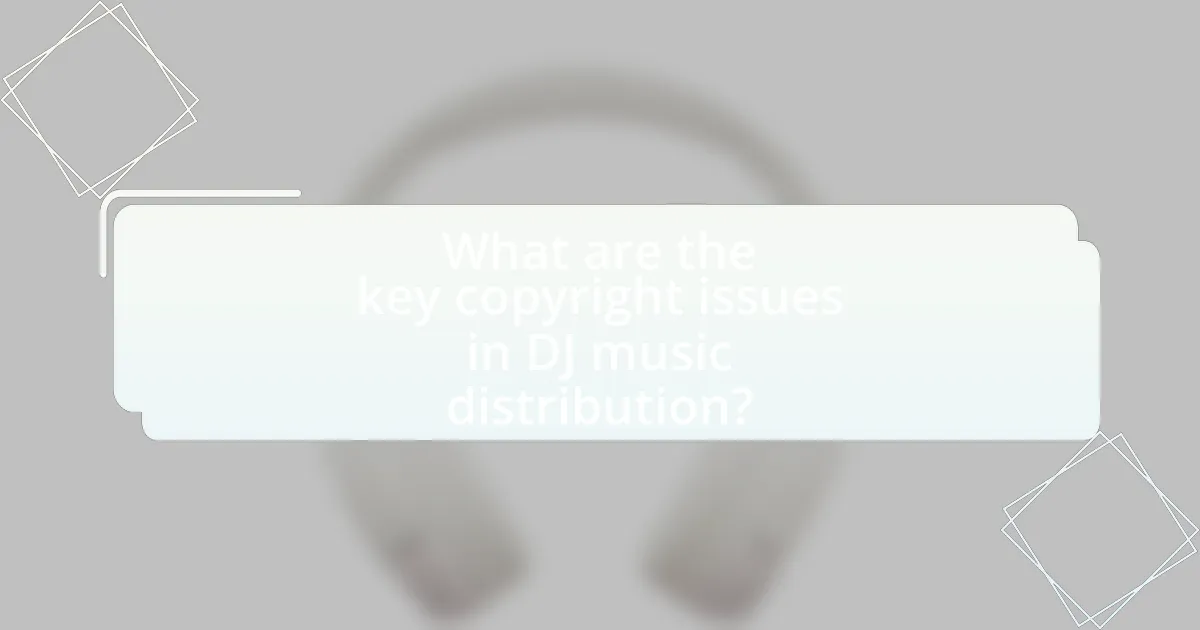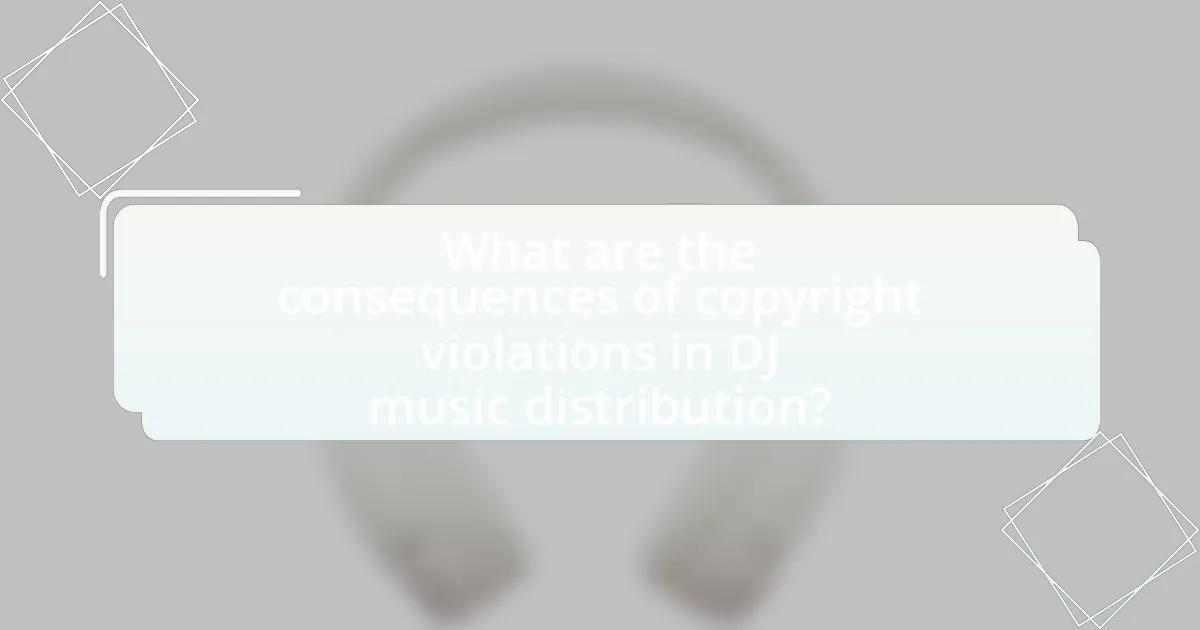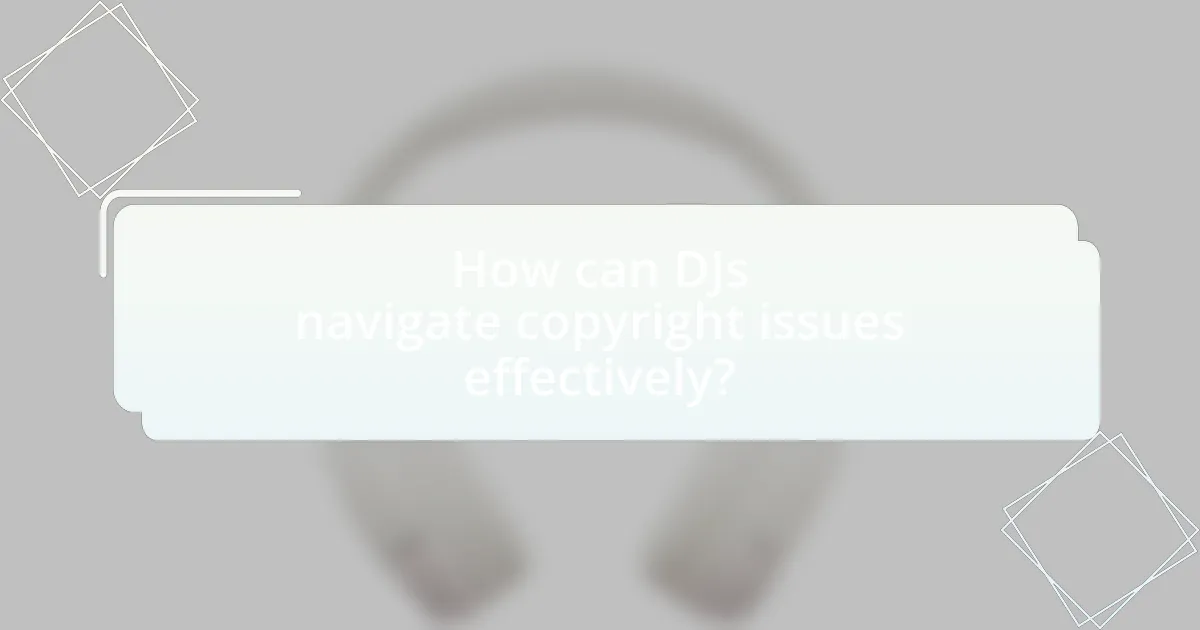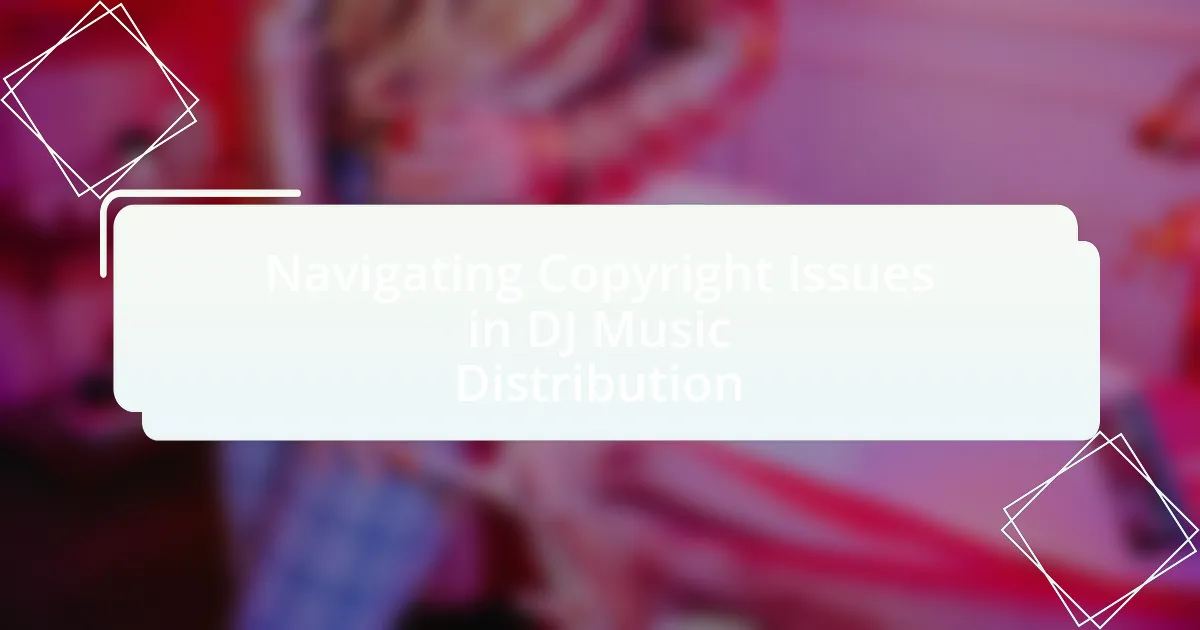The article focuses on navigating copyright issues in DJ music distribution, highlighting critical concerns such as unauthorized sampling, licensing requirements, and performance rights infringement. It explains how copyright law applies to DJ mixes, the implications of using samples, and the necessity of obtaining proper licenses to avoid legal repercussions. Additionally, the article outlines the types of music subject to copyright, the differences between original compositions and remixes, and the potential consequences of copyright violations, including financial penalties and damage to a DJ’s reputation. Practical tips for ensuring compliance with copyright laws and the benefits of using licensed music are also discussed, emphasizing the importance of understanding licensing requirements for DJs in the music industry.

What are the key copyright issues in DJ music distribution?
The key copyright issues in DJ music distribution include unauthorized sampling, lack of proper licensing, and infringement of performance rights. Unauthorized sampling occurs when DJs use portions of copyrighted tracks without permission, which can lead to legal disputes. Lack of proper licensing refers to the failure to obtain the necessary rights to distribute or perform music, which is essential for legal compliance. Infringement of performance rights arises when DJs play copyrighted music in public venues without securing the appropriate licenses from performance rights organizations, potentially resulting in fines or legal action. These issues highlight the importance of understanding copyright laws to avoid legal complications in the music distribution process.
How does copyright law apply to DJ mixes?
Copyright law applies to DJ mixes by protecting the original compositions and sound recordings used within those mixes. When a DJ incorporates copyrighted music into a mix, they may infringe on the rights of the original copyright holders unless they obtain proper licenses. The U.S. Copyright Act grants exclusive rights to creators, including the right to reproduce, distribute, and publicly perform their works. Therefore, DJs must secure licenses for the tracks they use to avoid legal repercussions, as unauthorized use can lead to copyright infringement claims. This legal framework is essential for ensuring that artists receive compensation for their work while allowing DJs to create and share their mixes legally.
What constitutes copyright infringement in DJ performances?
Copyright infringement in DJ performances occurs when a DJ plays, mixes, or samples copyrighted music without obtaining the necessary permissions or licenses from the copyright holders. This includes using tracks that are protected by copyright in a public setting, such as clubs or festivals, without proper authorization. According to the U.S. Copyright Act, the unauthorized reproduction, distribution, or public performance of copyrighted works constitutes infringement. Additionally, the Digital Millennium Copyright Act (DMCA) reinforces these protections by addressing the use of digital content. Therefore, DJs must secure licenses from performing rights organizations (PROs) like ASCAP or BMI to legally perform copyrighted music.
How can DJs ensure compliance with copyright laws?
DJs can ensure compliance with copyright laws by obtaining the necessary licenses for the music they play. This involves securing performance licenses from organizations such as ASCAP, BMI, or SESAC, which represent songwriters and publishers. Additionally, DJs should familiarize themselves with the specific copyright laws in their jurisdiction, as these can vary significantly. For instance, in the United States, the Copyright Act of 1976 provides the framework for music copyright, requiring DJs to pay royalties for public performances. By adhering to these licensing requirements and understanding local laws, DJs can legally perform music without infringing on copyright.
What types of music are subject to copyright?
All original music compositions, including lyrics, melodies, and arrangements, are subject to copyright. This includes genres such as pop, rock, classical, jazz, hip-hop, and electronic music. Copyright protection applies as soon as a piece of music is fixed in a tangible medium, such as a recording or written score. According to the U.S. Copyright Office, any original work of authorship that is expressed in a fixed form qualifies for copyright, ensuring that the creators retain exclusive rights to reproduce, distribute, and perform their music.
How do original compositions differ from remixes in terms of copyright?
Original compositions are protected by copyright from the moment of their creation, granting the creator exclusive rights to reproduce, distribute, and perform the work. In contrast, remixes often require permission from the original copyright holder, as they typically involve altering an existing copyrighted work. This distinction arises because remixes can be considered derivative works, which are subject to different copyright rules. For example, the U.S. Copyright Act stipulates that creating a derivative work without permission constitutes copyright infringement. Therefore, while original compositions automatically receive copyright protection, remixes necessitate obtaining licenses or permissions to avoid legal issues.
What are the implications of using samples in DJ sets?
Using samples in DJ sets can lead to significant copyright implications, including potential legal issues and financial liabilities. When DJs incorporate samples from copyrighted music without obtaining proper licenses, they risk infringing on the rights of the original creators, which can result in lawsuits or demands for royalties. According to the U.S. Copyright Office, unauthorized use of samples can lead to statutory damages ranging from $750 to $30,000 per infringement, and up to $150,000 for willful infringement. Additionally, platforms that host DJ mixes may remove content or ban users who violate copyright laws, further impacting a DJ’s ability to distribute their work. Therefore, understanding and navigating these copyright issues is crucial for DJs to protect themselves legally and financially.
Why is understanding licensing important for DJs?
Understanding licensing is crucial for DJs because it ensures legal compliance when using copyrighted music in performances. DJs who fail to understand licensing may face legal repercussions, including fines or lawsuits, as unauthorized use of music violates copyright laws. For instance, the U.S. Copyright Office states that public performances of copyrighted music require a license from the copyright holder or a performing rights organization. Therefore, by grasping the intricacies of music licensing, DJs can protect themselves legally and maintain their professional reputation while also supporting artists and the music industry.
What are the different types of licenses available for DJs?
DJs typically require several types of licenses to legally perform and distribute music. The primary licenses include performance licenses, which allow DJs to play copyrighted music in public venues; mechanical licenses, which permit the reproduction of music on physical media; and synchronization licenses, needed for pairing music with visual media. Performance licenses are often obtained through organizations like ASCAP, BMI, or SESAC, which manage the rights of songwriters and publishers. Mechanical licenses can be acquired through the Harry Fox Agency or similar entities. Synchronization licenses are negotiated directly with copyright holders. These licenses ensure that DJs comply with copyright laws while performing and distributing music.
How can DJs obtain the necessary licenses for their performances?
DJs can obtain the necessary licenses for their performances by contacting performance rights organizations (PROs) such as ASCAP, BMI, or SESAC to secure the appropriate licenses for the music they intend to play. These organizations manage the rights of songwriters and publishers, ensuring that they receive royalties when their music is performed publicly. By obtaining a license from a PRO, DJs can legally perform copyrighted music at venues, events, or broadcasts, thus avoiding potential legal issues related to copyright infringement.

What are the consequences of copyright violations in DJ music distribution?
Copyright violations in DJ music distribution can lead to legal repercussions, including lawsuits, fines, and the potential for criminal charges. When DJs distribute music without proper licensing, they infringe on the rights of copyright holders, which can result in civil lawsuits seeking damages that may amount to thousands or even millions of dollars. Additionally, copyright infringement can lead to the removal of content from platforms, loss of reputation, and restrictions on future distribution opportunities. According to the U.S. Copyright Office, unauthorized use of copyrighted material can also result in statutory damages ranging from $750 to $30,000 per work, depending on the circumstances.
What legal actions can be taken against DJs for copyright infringement?
DJs can face several legal actions for copyright infringement, including civil lawsuits, monetary damages, and injunctions. Civil lawsuits can be initiated by copyright holders seeking to enforce their rights, which may result in the DJ being ordered to pay damages that can range from statutory damages of up to $150,000 per infringement to actual damages incurred by the copyright owner. Additionally, copyright holders may seek injunctions to prevent further unauthorized use of their music, effectively stopping the DJ from performing or distributing infringing material. These legal actions are supported by the Copyright Act of 1976, which provides the framework for copyright protection and enforcement in the United States.
What are the potential financial penalties for violating copyright laws?
The potential financial penalties for violating copyright laws can include statutory damages ranging from $750 to $30,000 per work infringed, and up to $150,000 for willful infringement. These penalties are established under the U.S. Copyright Act, which allows copyright holders to seek damages in civil court. Additionally, violators may be responsible for the legal fees incurred by the copyright owner in pursuing the infringement claim. This framework underscores the significant financial risks associated with copyright violations in any context, including DJ music distribution.
How can copyright violations affect a DJ’s reputation?
Copyright violations can severely damage a DJ’s reputation by leading to legal repercussions and loss of credibility within the music industry. When a DJ uses copyrighted material without permission, they risk facing lawsuits, which can result in financial penalties and restrictions on their ability to perform or release music. Additionally, public awareness of such violations can lead to negative perceptions among fans and industry peers, diminishing trust and respect. For instance, high-profile cases, like that of DJ Khaled, who faced legal action for unauthorized use of a song, illustrate how copyright issues can tarnish a DJ’s image and career prospects.
What are the risks of using unauthorized music in DJ sets?
Using unauthorized music in DJ sets poses significant legal and financial risks. DJs may face copyright infringement lawsuits from music rights holders, which can result in substantial fines and legal fees. For instance, the U.S. Copyright Office enforces strict penalties for unauthorized use, including statutory damages ranging from $750 to $30,000 per infringement, and up to $150,000 for willful infringement. Additionally, unauthorized music usage can lead to the revocation of performance licenses and damage to a DJ’s professional reputation, limiting future opportunities in the industry.
How can unauthorized music usage lead to legal disputes?
Unauthorized music usage can lead to legal disputes primarily through copyright infringement claims. When individuals or entities use music without obtaining the necessary licenses or permissions from copyright holders, they violate the exclusive rights granted to those holders under copyright law. This can result in lawsuits, where copyright owners seek damages for unauthorized use, which can include statutory damages that range from $750 to $30,000 per work infringed, and in cases of willful infringement, up to $150,000 per work. Additionally, unauthorized usage can lead to cease-and-desist orders, injunctions to stop the infringing activity, and potential reputational harm for the infringer.
What are the long-term effects of copyright issues on a DJ’s career?
Long-term effects of copyright issues on a DJ’s career include potential legal battles, financial losses, and damage to reputation. Legal battles can arise from unauthorized use of copyrighted material, leading to costly litigation and settlements. Financial losses may occur due to fines or the inability to monetize performances and releases, as seen in cases where DJs faced penalties for using unlicensed samples. Additionally, a damaged reputation can result from publicized copyright disputes, which may deter venues and promoters from hiring the DJ, ultimately impacting their career longevity and growth in the industry.

How can DJs navigate copyright issues effectively?
DJs can navigate copyright issues effectively by obtaining proper licenses for the music they use in their performances. This involves understanding the different types of licenses, such as public performance licenses, which are often required for playing copyrighted music in public venues. Organizations like ASCAP, BMI, and SESAC provide these licenses, allowing DJs to legally perform a wide range of music. Additionally, DJs should consider using royalty-free music or tracks that are licensed under Creative Commons, which often have fewer restrictions. By adhering to these licensing requirements, DJs can avoid legal disputes and ensure their performances are compliant with copyright laws.
What best practices should DJs follow to avoid copyright problems?
DJs should obtain proper licenses for the music they play to avoid copyright problems. This involves securing performance licenses from organizations like ASCAP, BMI, or SESAC, which grant permission to publicly perform copyrighted music. Additionally, DJs should use music from licensed platforms or royalty-free sources, ensuring that the tracks are cleared for public performance. Keeping detailed records of the music played can also help in demonstrating compliance with copyright laws. These practices are essential as copyright infringement can lead to legal consequences, including fines and lawsuits.
How can DJs educate themselves about copyright laws?
DJs can educate themselves about copyright laws by accessing resources such as online courses, legal workshops, and industry seminars focused on music copyright. These educational platforms often provide comprehensive information on the nuances of copyright, including fair use, licensing requirements, and the implications of using copyrighted material in performances. For instance, organizations like the American Association of Independent Music (A2IM) and the Recording Industry Association of America (RIAA) offer valuable resources and guidance on copyright issues relevant to DJs. Additionally, reading books and articles authored by legal experts in music copyright can further enhance their understanding.
What resources are available for DJs to understand licensing requirements?
DJs can access several resources to understand licensing requirements, including the American Society of Composers, Authors and Publishers (ASCAP), Broadcast Music, Inc. (BMI), and the Performing Rights Organization (PRO). These organizations provide comprehensive guidelines on music licensing, including necessary permits for public performances and the use of copyrighted material. Additionally, the U.S. Copyright Office offers educational materials and resources that clarify copyright laws relevant to DJs. These resources are essential for ensuring compliance with legal standards in music distribution and performance.
What are the benefits of using licensed music for DJs?
Using licensed music provides DJs with legal protection and access to a wider range of tracks. Licensed music ensures that DJs comply with copyright laws, reducing the risk of legal issues and potential fines. Additionally, many licensed music platforms offer high-quality tracks that enhance the overall performance quality. According to the U.S. Copyright Office, using licensed music allows DJs to perform publicly without infringing on the rights of the original artists, which fosters a positive relationship within the music industry.
How does using licensed music enhance a DJ’s credibility?
Using licensed music enhances a DJ’s credibility by demonstrating professionalism and respect for copyright laws. When DJs utilize licensed tracks, they show that they are committed to ethical practices, which can attract more clients and venues that prioritize legal compliance. Furthermore, licensed music often includes higher quality audio and production values, which can elevate the overall performance quality. This adherence to licensing not only protects the DJ from potential legal repercussions but also builds trust with audiences and industry professionals, reinforcing their reputation as a serious and responsible artist.
What impact does licensed music have on audience engagement?
Licensed music significantly enhances audience engagement by creating a familiar and emotionally resonant atmosphere. When DJs use licensed tracks, they tap into the audience’s existing emotional connections to those songs, which can lead to increased enjoyment and participation. Research indicates that events featuring licensed music often see higher attendance and longer engagement times, as attendees are more likely to stay and interact when they recognize and enjoy the music being played. For example, a study by the University of Southern California found that live events with popular licensed music can increase audience retention by up to 30%, demonstrating the direct correlation between licensed music and audience engagement levels.
What practical tips can DJs implement to ensure copyright compliance?
DJs can ensure copyright compliance by obtaining licenses for the music they play. This involves registering with performance rights organizations (PROs) such as ASCAP, BMI, or SESAC, which manage the rights of songwriters and publishers. Additionally, DJs should use licensed music pools that provide tracks cleared for public performance. Keeping detailed records of all music played during gigs can also help in case of disputes. Furthermore, understanding the specific copyright laws in their region, including fair use provisions, is crucial for compliance. These practices are supported by the fact that failure to comply can result in legal action and fines, as highlighted by numerous cases in the music industry.

Leave a Reply